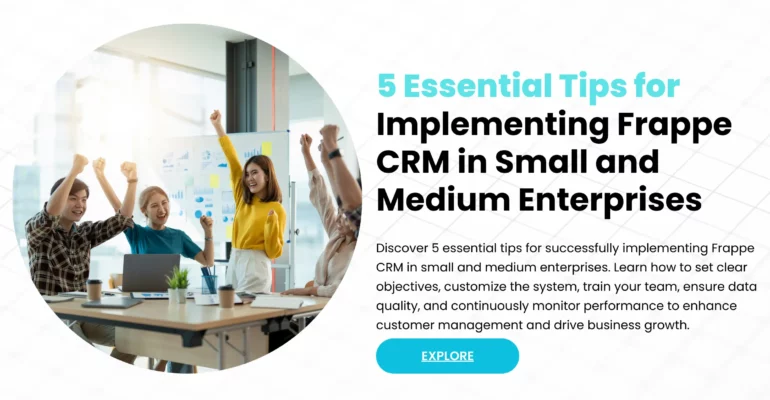5 Essential Tips for Implementing Frappe CRM

5 Essential Tips for Implementing Frappe CRM
Customer Relationship Management (CRM) systems are crucial for businesses of all sizes, but their implementation can be especially transformative for small and medium enterprises (SMEs). Frappe CRM, an open-source solution, offers a range of features designed to help SMEs manage customer interactions, streamline sales processes, and improve customer satisfaction. However, like any CRM implementation, there are best practices to follow to ensure success. Here are five essential tips for implementing Frappe CRM in SMEs.
5 Essential Tips for Implementing Frappe CRM in Small and Medium Enterprises

1. Define Clear Objectives and Goals
Why It Matters
Before diving into the implementation of Frappe CRM, it’s essential to have a clear understanding of what you aim to achieve. Defining specific objectives and goals helps in aligning the CRM’s capabilities with your business needs.
How to Do It
- Identify Pain Points: Start by identifying the pain points in your current customer management process. Are you facing issues with tracking leads, managing customer data, or measuring sales performance?
- Set Measurable Goals: Define measurable goals such as improving lead conversion rates, reducing customer response times, or increasing sales efficiency.
- Create a Roadmap: Develop a roadmap that outlines the steps needed to achieve these goals. This roadmap will guide the implementation process and keep your team focused.
2. Customize Frappe CRM to Fit Your Business Needs
Why It Matters
One of the strengths of Frappe CRM is its flexibility and customization options. Customizing the CRM to fit your specific business processes ensures that it adds maximum value.
How to Do It
- Tailor Modules: Customize the modules and fields to match your business processes. For example, if your business has a unique sales pipeline, ensure the CRM reflects this structure.
- Automate Workflows: Set up automated workflows to streamline repetitive tasks such as follow-up emails, lead assignment, and data entry.
- Use Custom Reports: Create custom reports that provide insights relevant to your business, such as sales performance, customer demographics, and activity tracking.
3. Train Your Team Effectively
Why It Matters
A CRM is only as effective as the people using it. Ensuring that your team is well-trained on Frappe CRM is crucial for a successful implementation.
How to Do It
- Comprehensive Training: Provide comprehensive training sessions covering all aspects of the CRM. Include hands-on exercises to help users become familiar with the system.
- Ongoing Support: Establish a support system for ongoing assistance. This can include internal help desks, user manuals, and regular refresher courses.
- User Feedback: Encourage feedback from users to identify areas where additional training or system adjustments may be needed.
4. Ensure Data Quality and Integrity
Why It Matters
High-quality data is essential for making informed decisions and maintaining effective customer relationships. Poor data quality can lead to misguided strategies and inefficiencies.
How to Do It
- Data Cleansing: Conduct a thorough data cleansing exercise before migrating existing data to Frappe CRM. Remove duplicates, correct inaccuracies, and standardize formats.
- Regular Audits: Implement regular data audits to maintain data quality. This helps in identifying and rectifying any discrepancies promptly.
- Data Governance: Establish data governance policies to ensure that data entry and management practices are consistent across the organization.
5. Monitor and Optimize Performance
Why It Matters
The implementation of a CRM system is not a one-time project. Continuous monitoring and optimization are necessary to ensure the CRM evolves with your business needs.
How to Do It
- Set Key Performance Indicators (KPIs): Define KPIs to measure the effectiveness of the CRM. These could include metrics such as customer satisfaction scores, lead conversion rates, and sales growth.
- Regular Reviews: Schedule regular reviews to assess the CRM’s performance. Use insights gained from these reviews to make necessary adjustments and improvements.
- Stay Updated: Keep the CRM system updated with the latest features and enhancements. Regular updates ensure that you’re leveraging the full potential of the software.
Conclusion
Implementing Frappe CRM in small and medium enterprises can significantly enhance customer management, improve sales processes, and drive business growth. By defining clear objectives, customizing the CRM, training your team, ensuring data quality, and continuously monitoring performance, you can maximize the benefits of Frappe CRM and achieve your business goals.
Start your journey towards better customer relationship management with these essential tips and unlock the full potential of Frappe CRM for your SME!
If you’re in need of expert guidance to seamlessly implement and customize ERPNext, maximizing its potential for your organization, you’ve come to the right place. Our experienced team is ready to assist you every step of the way.
Get in touch with us today! Whether you prefer to reach out via email at info@15.206.92.4 or give us a call at +91 9841205845, we’re here to help.
Alternatively, stay connected with us on various social media platforms including LinkedIn, YouTube, Facebook, Twitter, Pinterest, or Instagram. You’ll receive regular updates on ERPNext, Frappe CRM and other relevant topics.
Don’t hesitate! Embrace the power of ERPNext and witness your business soar to new heights!
Image Credit: Canva


